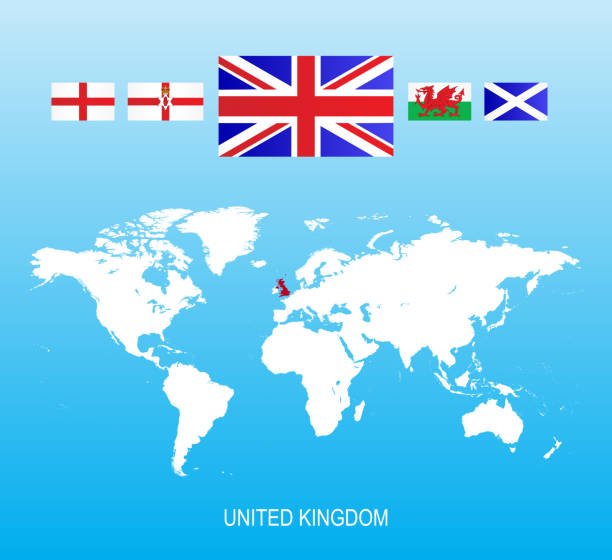Maybe you’ve asked this question yourself, or you’ve seen others debating whether England, Scotland, Wales, and Northern Ireland are states, countries, or something else entirely. It’s confusing, right? Some even assume the UK is just another name for England, but that’s far from the truth!
Read on to see how the UK is divided, what makes its structure so unique? And why does this question keep popping up? Let’s break it all down in a way that makes perfect sense. By the time you’re done reading, you’ll have the answer to these questions and understand why this mix-up happens so often!
READ ALSO: 22 Countries That Grant Citizenship By Birth
How many States are in the UK
The UK isn’t divided into states. Instead, it’s made up of four countries:
- England
- Scotland
- Wales
- Northern Ireland
England
England is the largest and most populous of the four countries that make up the UK. It is home to over 56 million people, which accounts for about 84% of the UK’s total population. England’s capital is London and is also the capital of the entire United Kingdom and serves as the country’s financial, political, and cultural center.

England is known for its historical influence, with landmarks like the Tower of London, Buckingham Palace, and Stonehenge. It is famous for institutions like Oxford and Cambridge universities; It is also the birthplace of Shakespeare, the Industrial Revolution, and modern parliamentary democracy.
Unlike Scotland, Wales, and Northern Ireland, England does not have its own parliament. Instead, it is directly governed by the UK Parliament in Westminster. The country has a strong economy, powered by industries like finance, technology, manufacturing, and tourism.
Scotland
Scotland is the second-largest country in the UK, both in terms of land area and population. It is home to about 5.4 million people and covers nearly one-third of the UK’s total landmass. The capital, Edinburgh, is famous for its stunning architecture, historic sites, and the world-renowned Edinburgh Festival.

One of the most distinctive aspects of Scotland is its legal and political system, which is different from that of England. Scotland has its own Scottish Parliament, which has the power to make laws on education, healthcare, and other domestic matters. It also has a separate legal system with its own courts and laws.
Scotland is known for its strong national identity, with traditions like kilts, bagpipes, and Highland Games. It also has a deep history, with famous landmarks such as Edinburgh Castle, Stirling Castle, and Loch Ness.
SEE ALSO: 15 Jobs In UK Nigerians Can Get On Their First Day
Wales
Wales may be smaller in size, but it has a powerful national identity. It is home to about 3.1 million people, with its capital in Cardiff. The country is known for its beautiful landscapes, including Snowdonia National Park and its rugged coastline.

One of the most defining features of Wales is its language and culture. Welsh is an official language alongside English, and over 20% of the population speaks it fluently. The country has a rich history of poetry, music, and storytelling, with events like the Eisteddfod, a festival celebrating Welsh culture and arts.
Like Scotland, Wales has its own Senedd (Welsh Parliament), which controls areas like health, education, and transportation. However, many laws are still decided by the UK government.
Northern Ireland
Northern Ireland is the smallest of the four UK countries, with a population of about 1.9 million people. Its capital, Belfast, played a major role in the shipbuilding industry and is famously the birthplace of the Titanic.

Unlike Scotland and Wales, Northern Ireland has a complex history, largely due to its relationship with the Republic of Ireland. It was created in 1921 when Ireland was divided, with Northern Ireland remaining part of the UK while the rest of Ireland became independent.
Northern Ireland has its own Northern Ireland Assembly, which has power over local issues like education and health. However, political divisions between unionists (who want to stay in the UK) and nationalists (who want to join Ireland) often make governance challenging.
The country is known for its natural beauty, including the famous Giant’s Causeway, as well as its deep cultural roots in music, literature, and sport.
READ ALSO: How to get a job in UK from Nigeria | Easy jobs to get in UK 2024
Each of these four countries has its own distinct identity, contributing to the UK’s rich tapestry of cultures and traditions. Understanding this structure helps in appreciating the diversity and unity that define the United Kingdom.
Why are there NO States in the UK?
Since the UK is made up of four countries that are NOT states and don’t work like US states either, so why doesn’t the UK have states? Below are three reasons:
1. The UK Was Built Differently from the US
Think about how the US was formed, different states came together to form the US with each keeping its own government, laws, and identity. That’s why every US state has its own rules.
The UK, though, didn’t start that way. Instead of states joining to form a country, separate nations united over time, each with its history, traditions, and legal systems. England and Wales merged first, then Scotland joined, and later Northern Ireland. Instead of creating “UK states,” these countries kept their names and some independence, even though they’re all part of one country now.
2. No Federal System, Just One Central Government
If the UK had states, each would have its own government, kind of like how Texas and California make their own laws in the US. But the UK doesn’t work that way. Instead, the UK has a unitary system, meaning the national government (based in London) has the final say.
Now, Scotland, Wales, and Northern Ireland do have their own parliaments that make decisions on things like healthcare and education. But these powers come from the UK government, and they don’t have full control like US states do.
And what about England? Well, it doesn’t even have its own parliament, all its laws are made by the UK government in London. So, rather than splitting the UK into states, the system is more about managing four distinct nations under one government.
SEE ALSO: 45 Visa Free Countries Nigerians Can Travel To In 2024
3. England Is Just Too Big
England Is too Dominant for a State System!
One major reason the UK does not use states is because of England’s size and influence. England alone makes up about 84% of the UK’s population and is the biggest in size, economy, political power, and landmass. If the UK were split into states, England would either:
- Dominate the smaller states politically, making them almost irrelevant.
- Be divided into smaller states itself, which would disrupt its historical identity.
Instead of breaking England into states, the UK kept the four nations separate.
READ ALSO: 15 Jobs In Canada Nigerians Can Get On Their First Day
If the UK doesn’t have States, what does it have?
Okay, so if the UK doesn’t have states, what does it have? The UK uses Counties instead.
Counties handle local issues like schools, roads, and public services, but they don’t make big national laws. Each UK country has its own counties; below is a table that shows the major counties in each of the countries.

Major Cities and Counties in each Country in the UK
Understand that counties do not create national laws, that is the responsibility of either the UK government or the devolved governments in Scotland, Wales, and Northern Ireland.
Below is a detailed table showing the counties and major cities in each of the four UK nations.
| Country | Major Cities | Counties |
|---|---|---|
| England | London, Manchester, Birmingham, Liverpool, Leeds, Newcastle, Bristol, Sheffield | Greater London, West Midlands, Greater Manchester, Merseyside, Yorkshire, Lancashire, Essex, Kent, Hampshire |
| Scotland | Edinburgh, Glasgow, Aberdeen, Dundee, Inverness | Aberdeenshire, Fife, Highland, Lanarkshire, Midlothian, Renfrewshire |
| Wales | Cardiff, Swansea, Newport, Wrexham | Gwynedd, Powys, Monmouthshire, Carmarthenshire, Pembrokeshire, Ceredigion |
| Northern Ireland | Belfast, Londonderry (Derry), Lisburn, Newry | Antrim, Armagh, Down, Fermanagh, Londonderry, Tyrone |
This breakdown highlights how the UK is structured with countries, cities, and counties, rather than states.
Think of counties like local districts; they exist for administrative reasons but don’t have the power of a US state.
SEE ALSO: Countries With The Highest And Lowest Minimum Wage In The World
Will the UK Ever Have States?
Probably not. The UK’s system has been this way for centuries. Even though Scotland and Wales have gained more independence in recent years, they still aren’t states, they’re countries within a country. And while there have been discussions about Scotland leaving the UK altogether, nothing has changed yet.
So, the next time someone asks, “How many states are in the UK?” you’ll know exactly what to say: None. The UK isn’t split into states, it comprises four countries, each with its own identity and history.
I hope this clears up how the UK is organized. And I hope you have learnt something here; help others learn by sharing this post and dropping a comment below. Thanks for reading!









